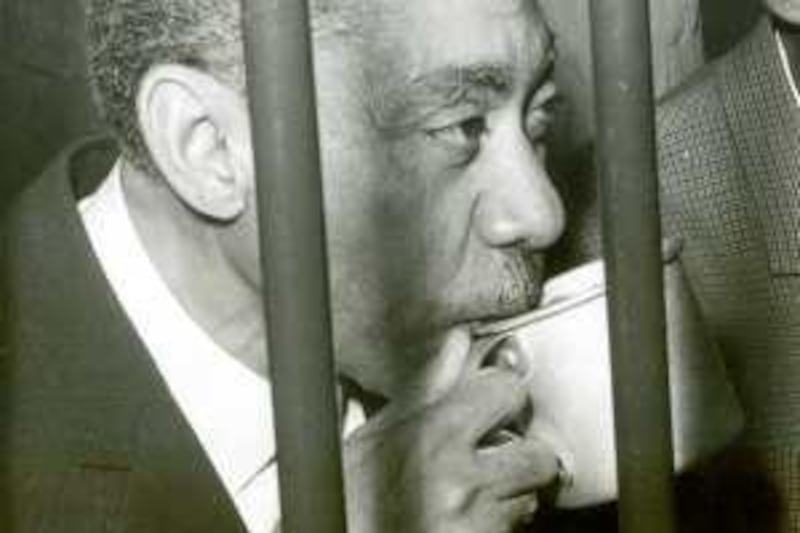CAIRO // Members of Egypt's Muslim Brotherhood, an officially outlawed Islamist organisation, have long been regular fixtures in Egypt's prisons. So while the arrest this week of 15 of the organisation's top leaders was seen as only the latest roundup of Brotherhood members, one of the accusations in their charge sheet stood out: three of the detained were accused of sympathising with the radical thinking of Sayyid Qutb, the Egyptian Islamist intellectual widely singled out for inspiring ideas of Islamist militancy.
Analysts said the accusations may point to a new tactic of smearing the Brotherhood by reconnecting them to the spectre of the long-dead Qutb. It is a gambit that could have unintended consequences, warned Sherif Younes, a historian and author of the book Qutb and Islamic Fundamentalism. "They are thinking about how to blame those who were captured and so raised the issue of Qutbism. But I don't think that they really understand what is the meaning of bringing Qutb back," said Younes. Qutb's philosophical mix of political Islam and religious romanticism were dangerous during the 1960s, and could become so once again, he said.
While Qutb's writings formed a thorough exegesis of the Quran, it was his famous theories of "offensive jihad" that still inform modern radical Islamists such as Osama bin Laden, who is thought to have studied under Qutb's younger brother, Mohammed Qutb. Qutb believed that modern Muslims have tacitly rejected the teachings of the Prophet Mohammed, returning instead to the period of pre-Islamic ignorance known as jahiliyyah.
Salvation for Muslims would come only from the reinstatement of Sharia, Qutb wrote. But he went several steps further, condemning those Muslims who did not defend the Sharia as apostates - a practice known as takfir. Qutb, who was a prominent leader in the Brotherhood during the 1950s, took particular aim at the governments of Muslim-majority countries, which he said had strayed from Islam's true path and should therefore be overthrown.
Such talk prompted Gamal Abdel Nasser, one of the first presidents of independent Egypt, to imprison and ultimately execute Qutb in 1966. Brotherhood leaders say that in the most recent arrests, the Egyptian government is seeking to exploit the political history of Mohammed Badie, the Brotherhood's new General Guide, or leader, who was elected last month. Mr Badie, who was not arrested, was once a follower of Qutb during the 1960s.
According to the Egyptian daily newspaper Al Masry Al Yawm, which has published a series of articles on Mr Badie this week, he admitted to police during a 1965 interrogation that he had received explosives, small-weapons and hand-to-hand combat training from a Qutbist group. "The media made use of the fact that the new General Guide had once upon a time adopted Qutbian ideas," said Abd el Moneim Abou al Fotouh, a senior member of the Brotherhood. Mr al Fotouh said this week's arrests mark the first time that Muslim Brotherhood leaders from the office of the General Guide were accused of sympathising with Qutb - an accusation that, while not among the formal charges against the men, could bolster the prosecution's allegation that Brotherhood members are conspiring to overthrow the Egyptian state.
Law enforcement officials accused the deputy leader, Mohamed Ezzat, and two other senior members, Essam el Erian and Abdel-Rahman el Bir, of seeking to inculcate a faction within the Brotherhood with Qutbian thought. But in an interview on Wednesday, Mr al Fotouh said that of those who were arrested, only Mr Ezzat had ever sympathised with Qutb decades before the Brotherhood distanced itself from Qutbist ideology. Mr Ezzat was also accused of being the group's "secret leader".
In 1977, Hassan al Houdaiby, who was then the Muslim Brotherhood's leader, published a book called Preachers, Not Judges, which was widely seen as the Brotherhood's formal rejection of Qutb's philosophy of takfir. The book articulated what would become the organisation's more nuanced approach to Islamist thought: to guide adherents toward righteousness instead of judging or condemning those who had strayed from the correct path. But even Preachers, Not Judges revealed Qutb's abiding resonance among Brotherhood members, said Mr Younes. The book made no direct reference to Qutb, and instead criticised the work of Abul A'ala Maududi, a Pakistani Islamist who inspired much of Qutb's writing.
As Qutb's divisive philosophy continues to inspire Islamist groups throughout the world, his impact on political thought in Egypt remains difficult to gauge. While the Brotherhood cannot deny their past affinity to Qutb's ideas, they have completely disavowed his more violent principles, said Gamal al Banna, a reformist cleric and the younger brother of the Muslim Brotherhood's founder, Hassan al Banna. The younger Mr al Banna is not a member of the Muslim Brotherhood.
"Practically speaking, a minority of Muslim Brothers are impressed by Sayyid Qutb's ideas," he said. "It's absolutely not all of them. Maybe 40 per cent of them." mbradley@thenational.ae





